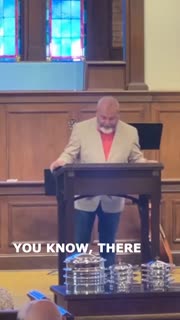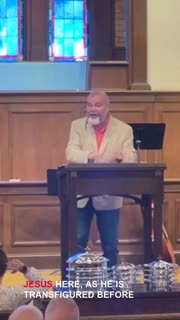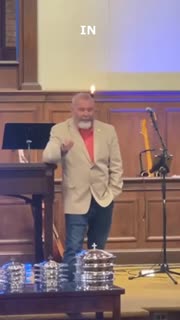Transfiguration: Hearing Jesus and Embracing His Authority
Devotional
Sermon Summary
Bible Study Guide
Sermon Clips
1) "You know, there is a great difference between listening and hearing. If you have two functioning ears on either side of your head, you can listen. You hear the sounds and you hear the syllables. But hearing implies comprehension. Hearing implies that not only are you listening, but you are comprehending that which is spoken. And that makes a big difference. You know, here we're talking about an account, by the way, this account of the transfiguration. We'll talk about the transfiguration in just a minute. But this event in the life of Jesus marks almost the exact middle of Mark's gospel. It's as if Mark positioned this account right in the center of his proclamation because he wanted us to consider that everything that he's relating in his gospel swings on the hinges of the Transfiguration." [03:39] (72 seconds)
2) "Jesus here, as he is transfigured before his disciples, what he is emanating does not come from a reflection that it is radiating from within him. Rc Sproul says, in this moment, the cloak of his humanity burst forth, revealing the full deity of Christ to his watching disciples. In that moment, the veil was pulled back, and Peter, James, and John saw Jesus for exactly who he is. They saw him in all of his glory, the glory that he had laid down. You know, Paul so eloquently describes the incarnation in Philippians two how Christ didn't think equality with God was something to be grasped hold of. But he emptied himself. What did he empty himself of? He emptied himself of the glory so that he could come and take on the flesh, the form of a servant, so that he would lay his life down as the sacrifice." [09:28] (79 seconds)
3) "In the middle of this account, something truly incredible happened. God himself, God the Father, broke his silence and says, this is my beloved son. Listen to him. Listen to him. Not merely with the two organs that are hanging on the side of your head. Hear him. Hear what Jesus says. Hear his word. Because, you see, Jesus word is the word of God. What Jesus says is what God says. What Jesus does is what God does, because Jesus is God. Hear him. Hear him. You see, we live in a day when we want to be selective in what we believe about God. We want to be selective in what parts of the Bible that we will obey." [25:09] (84 seconds)
4) "Friends, Jesus is God. Hear him. God has established boundaries for our lives. It's called his word. And he knows if we live within the boundaries of his word and we follow him and we worship him, then our lives are going to be filled with his joy and it's really truly going to be blessed. It's when we get outside of God's word, when we try to establish a righteousness in and of ourselves apart from God. But when we try to turn our faith into nothing but a bunch of moralisms to become more moral sinners, it's when we do that that we miss the blessing of what it means to be a child of God. So I close with the question, do you hear? Do you hear? If you hear his voice, obey him, fall down and worship him because he is God. Amen." [36:21] (98 seconds)
Ask a question about this sermon
2) "Jesus here, as he is transfigured before his disciples, what he is emanating does not come from a reflection that it is radiating from within him. Rc Sproul says, in this moment, the cloak of his humanity burst forth, revealing the full deity of Christ to his watching disciples. In that moment, the veil was pulled back, and Peter, James, and John saw Jesus for exactly who he is. They saw him in all of his glory, the glory that he had laid down. You know, Paul so eloquently describes the incarnation in Philippians two how Christ didn't think equality with God was something to be grasped hold of. But he emptied himself. What did he empty himself of? He emptied himself of the glory so that he could come and take on the flesh, the form of a servant, so that he would lay his life down as the sacrifice." [09:28] (79 seconds)
3) "In the middle of this account, something truly incredible happened. God himself, God the Father, broke his silence and says, this is my beloved son. Listen to him. Listen to him. Not merely with the two organs that are hanging on the side of your head. Hear him. Hear what Jesus says. Hear his word. Because, you see, Jesus word is the word of God. What Jesus says is what God says. What Jesus does is what God does, because Jesus is God. Hear him. Hear him. You see, we live in a day when we want to be selective in what we believe about God. We want to be selective in what parts of the Bible that we will obey." [25:09] (84 seconds)
4) "Friends, Jesus is God. Hear him. God has established boundaries for our lives. It's called his word. And he knows if we live within the boundaries of his word and we follow him and we worship him, then our lives are going to be filled with his joy and it's really truly going to be blessed. It's when we get outside of God's word, when we try to establish a righteousness in and of ourselves apart from God. But when we try to turn our faith into nothing but a bunch of moralisms to become more moral sinners, it's when we do that that we miss the blessing of what it means to be a child of God. So I close with the question, do you hear? Do you hear? If you hear his voice, obey him, fall down and worship him because he is God. Amen." [36:21] (98 seconds)




